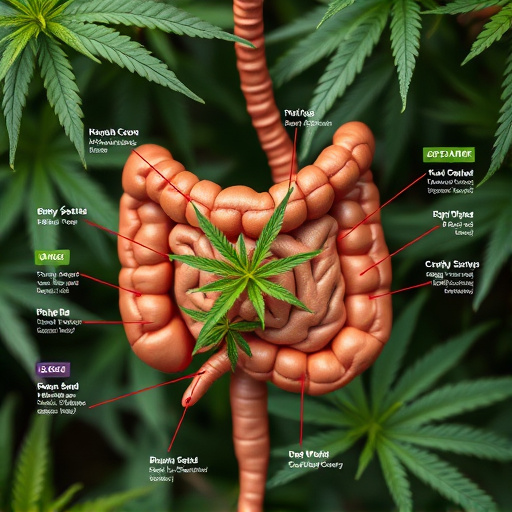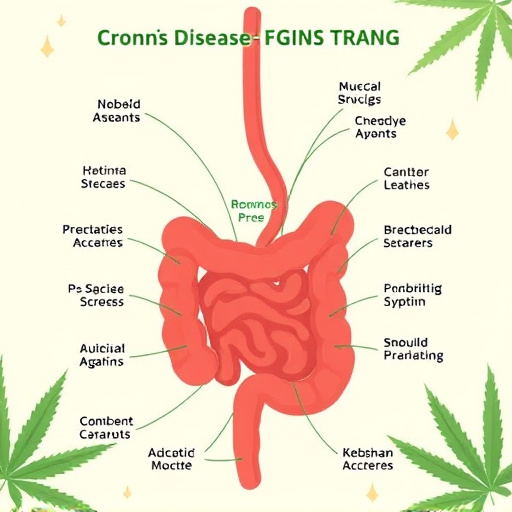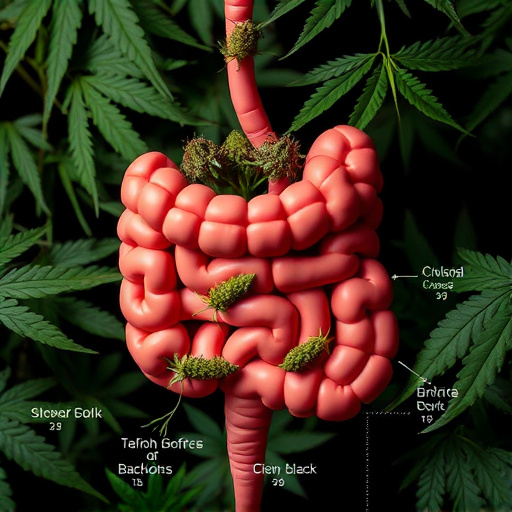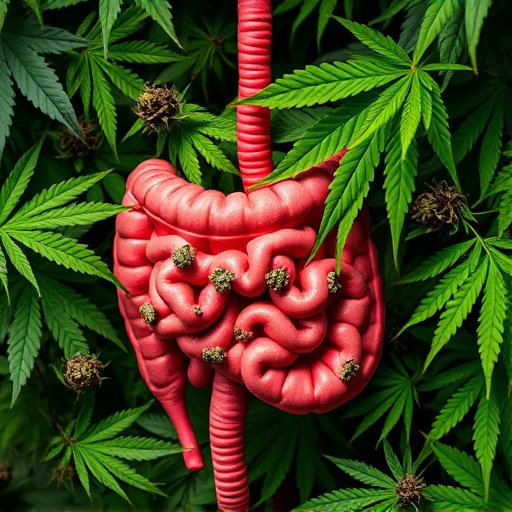For Crohn's disease patients seeking symptom relief, specific high-CBD, low-THC cannabis strains offer promise, particularly for managing short-term pain and inflammation. These interact with the endocannabinoid system to reduce inflammation. Personalized consulting with healthcare professionals is crucial to identify suitable strains and dosages tailored to individual needs, ensuring safe and effective management while considering potential long-term effects.
“The relationship between Crohn’s disease and cannabis is a complex, evolving narrative. This article delves into the multifaceted impact of both short- and long-term cannabis use on patients with Crohn’s. We explore the immediate effects on symptom management, dissecting the potential benefits and risks of various cannabis strains for acute relief. Additionally, we investigate the role of chronic cannabis therapy in maintaining remission, focusing on specific compounds’ influence on intestinal inflammation. Understanding side effects and individual variations in cannabinoid receptivity is paramount to navigating effective yet safe treatments for Crohn’s disease.”
- Short-Term Effects of Weed on Crohn's Disease Patients
- – Exploring the immediate impact of cannabis use on symptoms management
- – Potential benefits and risks of different cannabis strains for short-term relief
Short-Term Effects of Weed on Crohn's Disease Patients

For Crohn’s disease patients, exploring the potential benefits of cannabis has become an increasingly popular avenue to alleviate symptoms. In the short term, cannabis can offer significant relief for these patients, especially when it comes to managing pain and reducing inflammation. The active compounds in cannabis, particularly THC and CBD, interact with the endocannabinoid system, which plays a crucial role in regulating immune responses and maintaining intestinal homeostasis. This interaction may help mitigate the intense discomfort and inflammation associated with Crohn’s disease flare-ups.
Research suggests that specific cannabis strains high in CBD can be particularly effective for short-term symptom management. These strains may help reduce diarrhea, abdominal pain, and other acute symptoms without inducing excessive drowsiness or cognitive impairment, which are common side effects of higher THC concentrations. However, it’s important to note that individual responses vary, and patients should consult healthcare professionals to determine the most suitable cannabis strains and dosages for their specific needs.
– Exploring the immediate impact of cannabis use on symptoms management

Cannabis has gained attention as a potential aid for managing symptoms associated with various medical conditions, including Crohn’s disease. The immediate impact of cannabis use is an area of growing interest in the medical community. Research suggests that certain cannabis strains can effectively alleviate pain, reduce inflammation, and ease stress and anxiety—symptoms often experienced by those living with Crohn’s. These benefits are primarily attributed to the active compounds THC and CBD, which interact with the body’s endocannabinoid system.
For individuals with Crohn’s disease, exploring cannabis as a complementary therapy offers hope for improved quality of life. The immediate effects can range from providing pain relief and reducing intestinal inflammation to promoting relaxation and better sleep. However, it’s crucial to emphasize that the choice to use cannabis should be informed and individualized. Different strains have varying levels of THC and CBD, so finding the right fit is essential. Consulting healthcare professionals who specialize in cannabis medicine is key to ensuring safe and effective symptom management while considering potential long-term effects.
– Potential benefits and risks of different cannabis strains for short-term relief

For individuals seeking short-term relief from symptoms like chronic pain, inflammation, and nausea, specific cannabis strains can offer potential benefits. Certain high-CBD, low-THC strains are particularly popular for their calming effects and minimal psychotropic properties, making them suitable for managing acute discomfort without inducing anxiety or paranoia. These strains can be beneficial for conditions such as Crohn’s disease, where symptoms like abdominal pain and inflammation may require temporary relief.
However, the risks associated with short-term cannabis use include potential respiratory issues due to inhalation methods and cognitive impairments that can affect concentration and memory. Additionally, while CBD is often touted for its anti-inflammatory properties, individual responses vary, and some users might experience adverse reactions. Long-term effects of frequent cannabis consumption are still being studied, but there are concerns regarding its impact on mental health and potential addiction, especially in young individuals.
In conclusion, while cannabis has shown promise in managing symptoms of Crohn’s disease, both short- and long-term effects must be carefully considered. Short-term relief is achievable through exploring various cannabis strains, but it’s crucial to balance potential benefits with known risks. Long-term use warrants further study to fully understand its impact on the condition and overall well-being of patients. As research continues, personalized medicine approaches that factor in individual patient needs and preferences are likely to become the norm in managing Crohn’s disease with cannabis.














